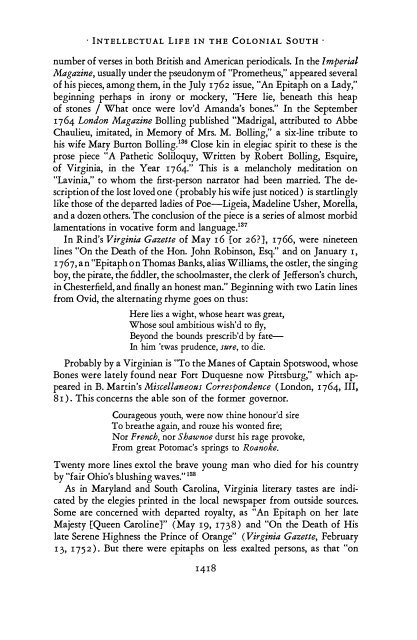Literature, Principally Belletristic - University of Tennessee, Knoxville
Literature, Principally Belletristic - University of Tennessee, Knoxville
Literature, Principally Belletristic - University of Tennessee, Knoxville
You also want an ePaper? Increase the reach of your titles
YUMPU automatically turns print PDFs into web optimized ePapers that Google loves.
· INTELLECTUAL LIFE IN THE COLONIAL SOUTH '<br />
number <strong>of</strong> verses in both British and American periodicals. In the Imperial<br />
Magazine, usually under the pseudonym <strong>of</strong> "Prometheus," appeared several<br />
<strong>of</strong> his pieces, among them, in the July 1762 issue, "An Epitaph on a Lady,"<br />
beginning perhaps in irony or mockery, "Here lie, beneath this heap<br />
<strong>of</strong> stones / What once were lov'd Amanda's bones." In the September<br />
1764 London Magazine Bolling published "Madrigal, attributed to Abbe<br />
Chaulieu, imitated, in Memory <strong>of</strong> Mrs. M. Bolling," a six-line tribute to<br />
his wife Mary Burton Bolling.lss Close kin in elegiac spirit to these is the<br />
prose piece "A Pathetic Soliloquy, Written by Robert Bolling, Esquire,<br />
<strong>of</strong> Virginia, in the Year 1764." This is a melancholy meditation on<br />
"Lavinia," to whom the first-person narrator had been married. The description<br />
<strong>of</strong> the lost loved one (probably his wife just noticed ) is startlingly<br />
like those <strong>of</strong> the departed ladies <strong>of</strong> Poe-Ligeia, Madeline Usher, Morella,<br />
and a dozen others. The conclusion <strong>of</strong> the piece is a series <strong>of</strong> almost morbid<br />
lamentations in vocative form and language.1s7<br />
In Rind's Virginia Gazette <strong>of</strong> May 16 [or 26?}, 1766, were nineteen<br />
lines "On the Death <strong>of</strong> the Hon. John Robinson, Esq." and on January I,<br />
1767, an "Epitaph on Thomas Banks, alias Williams, the ostler, the singing<br />
boy, the pirate, the fiddler, the schoolmaster, the clerk <strong>of</strong> Jefferson's church,<br />
in Chesterfield, and finally an honest man." Beginning with two Latin lines<br />
from Ovid, the alternating rhyme goes on thus:<br />
Here lies a wight, whose heart was great,<br />
Whos soul ambitious wish'd to fly,<br />
Beyond the bounds prescrib'd by fate<br />
In him 'twas prudence, sure, to die.<br />
Probably by a Virginian is "To the Manes <strong>of</strong> Captain Spotswood, whose<br />
Bones were lately found near Fort Duquesne now Pittsburg," which appeared<br />
in B. Martin's Miscellaneous Correspondence (London, 1764, III,<br />
81). This concerns the able son <strong>of</strong> the former governor.<br />
Courageous youth, were now thine honour'd sire<br />
To breathe again, and rouze his wonted fire;<br />
Nor French, nor Shawnoe durst his rage provoke,<br />
From great Potomac's springs to Roanoke.<br />
Twenty more lines extol the brave young man who died for his country<br />
by "fair Ohio's blushing waves." lS8<br />
As in Maryland and South Carolina, Virginia literary tastes are indicated<br />
by the elegies printed in the local newspaper from outside sources.<br />
Some are concerned with departed royalty, as "An Epitaph on her late<br />
Majesty [Queen Caroline}" (May 19, 1738) and "On the Death <strong>of</strong> His<br />
late Serene Highness the Prince <strong>of</strong> Orange" (Virginia Gazette, February<br />
13, 1752) . But there were epitaphs on less exalted persons, as that "on<br />
1418















